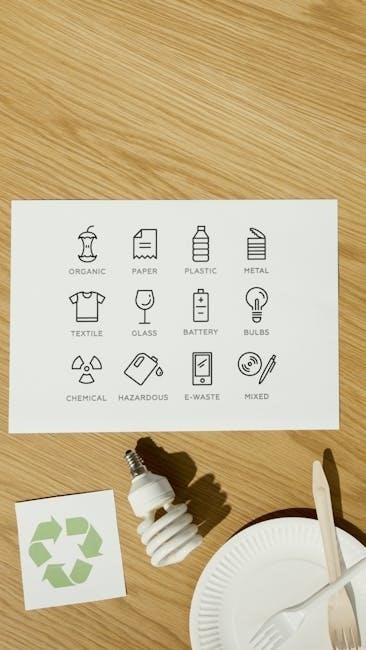The San Jose Recycling Guide provides essential information on reducing waste, reusing materials, and properly recycling in the city. It helps residents and businesses navigate local programs, drop-off locations, and best practices to promote sustainability and environmental conservation.
Overview of Recycling Programs in San Jose
San Jose offers comprehensive recycling programs to reduce waste and promote sustainability. The city operates advanced recycling facilities that sort and process materials, with only about 25% of waste sent to landfills. Programs include curbside collection, drop-off centers, and special waste disposal services. The city also addresses contamination issues, aiming to improve recycling efficiency and reduce environmental impact through education and innovative initiatives.

What Can Be Recycled in San Jose
In San Jose, residents can recycle paper, plastic, glass, and metal through curbside collection and drop-off centers. Special items like batteries and electronics require specific disposal methods.
Common Household Items Accepted for Recycling
San Jose accepts various household items for recycling, including paper, cardboard, glass bottles, plastic containers, and metal cans. These items can be placed in curbside recycling bins. Additionally, materials like newspaper, junk mail, and cardboard boxes are widely accepted. Residents are encouraged to rinse containers and remove lids before recycling. For precise guidelines, refer to the city’s official recycling list to ensure proper disposal and maximize resource conservation efforts.
Special Items and Hazardous Waste Disposal
San Jose provides specific guidelines for disposing of special and hazardous items, such as batteries, electronics, and chemicals. These items require special handling and cannot be placed in regular recycling or trash bins. Residents can drop off hazardous waste at designated facilities, like the Household Hazardous Waste Facility at 1590 Senter Rd. Check the city’s website for detailed guidelines to ensure safe and proper disposal of these materials.
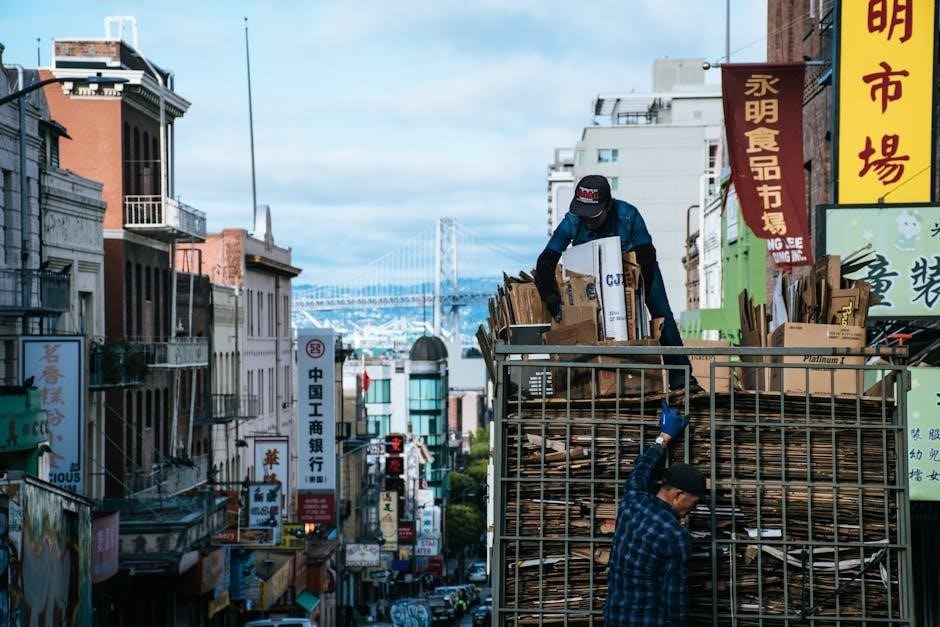
Recycling Drop-Off Locations
San Jose offers multiple recycling drop-off locations, including city-operated centers and participating retail stores. Visit Valley Services at 1611 S. 7th St or check retailers like Home Depot for special materials drop-off.
City-Operated Recycling Centers
San Jose’s city-operated recycling centers, such as Valley Services at 1611 S. 7th St, accept a wide range of materials, including paper, plastic, glass, and metal. Open Monday-Friday from 6 AM to 6 PM, these centers provide a convenient option for residents to drop off recyclables. Note that hazardous waste and bulky items are not accepted here. Visit the City of San Jose website for a full list of accepted materials and additional locations.
Participating Retail Stores for Special Materials
Participating retail stores in San Jose, such as big-box stores and supermarkets, offer drop-off bins for special materials like plastic bags and batteries. These locations are conveniently placed near store entrances. For example, many grocery stores accept plastic bags, while electronics retailers may take batteries or devices. Visit the City of San Jose’s website or use the recycling search engine to find the nearest participating store for specific items like books or hazardous waste.
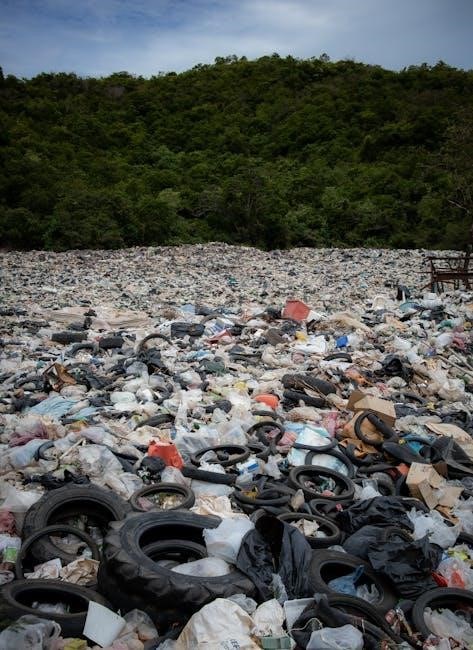
Reducing Waste and Reusing Materials
San Jose encourages residents to adopt sustainable practices by reducing waste and reusing materials. Strategies include composting, donating items, and repurposing household goods to minimize landfill use.
Tips for Minimizing Waste at Home
To minimize waste, start by composting food scraps and yard trimmings. Donate gently used items instead of discarding them. Repurpose household goods creatively, like turning old jars into storage containers. Avoid single-use products and opt for reusable alternatives. Properly sort recyclables and keep food, liquids, and soiled items out of recycling bins to reduce contamination. Small changes can make a big difference in reducing landfill waste.
Creative Ways to Reuse Everyday Items
Transform old clothing into reusable rags or quilts. Convert cardboard boxes into storage containers or craft projects. Use glass jars for storing food or DIY projects. Metal cans can become pen holders or small planters. Turn scrap paper into notepads or gift wrapping. Donate items in good condition to local charities or thrift stores. Get creative with items like plastic bottles for bird feeders or newspaper for composting. These ideas help reduce waste while fostering ingenuity.
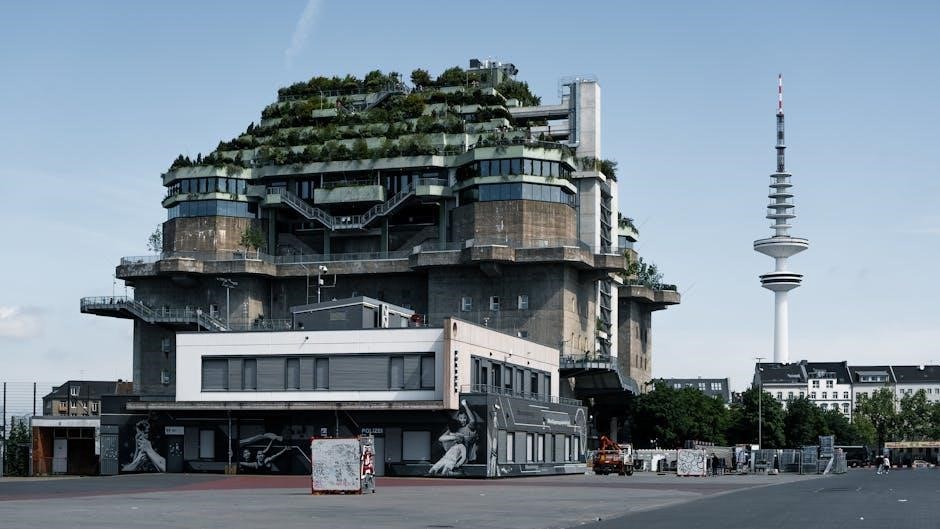
Recycling Contamination and Best Practices
San Jose faces rising contamination rates in recycling, with food and liquids being top offenders. Properly rinse containers and avoid mixed materials to ensure efficient processing and environmental benefits.
Understanding Contamination Rates in San Jose
San Jose has seen a significant rise in recycling contamination rates, from 32% in 2015 to over 50% by 2020. Contamination occurs when non-recyclable items, like food-soiled containers or liquids, are placed in recycling bins. This not only damages materials but also increases processing costs. Properly rinsing items and avoiding mixed materials are crucial to reducing contamination and ensuring efficient recycling processes.
How to Properly Prepare Items for Recycling
To ensure effective recycling, residents must properly prepare items. Rinse food and liquid residue from containers, remove lids, and avoid bagging recyclables. Keep materials loose in bins. Flatten cardboard and corrugated boxes to save space. Check the city’s accepted items list to confirm eligibility. Avoid including non-recyclable materials like plastic bags or soiled paper. Proper preparation helps maintain the quality of recyclables and supports efficient processing.
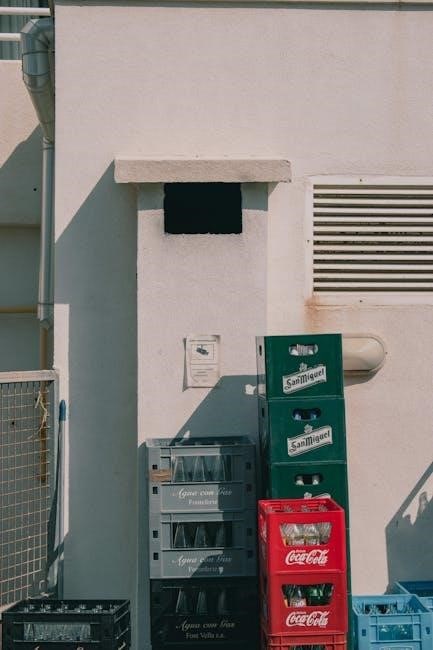
Community Resources and Support
The city offers workshops, educational programs, and online tools to guide residents in recycling. Resources include the Environmental Services Department website and community events promoting sustainability practices.
Workshops and Educational Programs
San Jose provides interactive workshops and educational programs to educate residents on effective recycling practices. These sessions cover topics like proper waste sorting, reducing contamination rates, and creative reuse of materials. The Environmental Services Department often hosts these events, aiming to empower the community with knowledge and skills to contribute to a more sustainable future. Regular updates are available on the city’s official website.
Online Tools for Recycling Guidance
San Jose offers various online tools to guide residents on proper recycling practices. The city’s official website provides a recycling search engine and a waste sorter tool to help identify acceptable materials. Additionally, resources like SanJoseRecycles.org and recyclestuff.org offer detailed guides, collection schedules, and drop-off locations. These platforms also include educational materials and tips for reducing waste, ensuring residents can make informed decisions and contribute to the city’s sustainability goals effectively.

Environmental Impact of Recycling in San Jose
Recycling in San Jose significantly reduces greenhouse gas emissions and conserves natural resources, supporting the city’s sustainability goals and promoting a healthier environment for future generations.
Conservation of Natural Resources
Recycling in San Jose plays a vital role in conserving natural resources by reducing the need for raw material extraction. By reusing materials like paper, metal, and glass, the city decreases energy consumption and lowers greenhouse gas emissions. This approach not only protects ecosystems but also helps sustain resources for future generations, aligning with San Jose’s commitment to environmental stewardship and community well-being.
Reducing Greenhouse Gas Emissions
Recycling in San Jose significantly contributes to reducing greenhouse gas emissions by minimizing the energy needed for producing new materials. For instance, recycling aluminum cans uses 95% less energy than producing new ones. This reduction in energy consumption directly lowers carbon emissions, helping San Jose meet its climate goals and promote a healthier environment for its residents and future generations.

Recycling Challenges and Solutions
San Jose faces challenges like contamination in recycling streams, requiring better education and awareness. Solutions include community workshops, clear guidelines, and innovative programs to improve recycling practices.
Addressing Common Recycling Mistakes
Common recycling mistakes in San Jose include improper sorting, food residue on items, and including non-recyclable materials like plastic bags. Contamination rates have risen, with over 50% of single-family recycling bins containing non-recyclable items by 2020. To address this, residents should rinse containers, avoid bagging recyclables, and ensure hazardous waste like batteries and electronics are disposed of correctly. Education and clear guidelines are key to improving recycling accuracy and reducing contamination.
Initiatives to Improve Recycling Rates
San Jose has implemented initiatives like automated sorting facilities and public education campaigns to boost recycling rates. The city operates two advanced recycling plants, reducing landfill contributions. Educational programs and digital tools help residents understand proper recycling practices. Additionally, partnerships with schools and businesses promote waste reduction and reuse, aligning with San Jose’s goal to become carbon neutral by 2030 and foster a culture of sustainability.
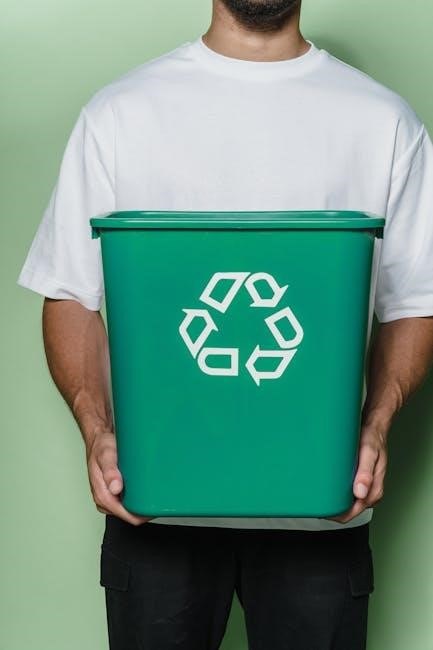
Future of Recycling in San Jose
San Jose is committed to advancing recycling technology and education, aiming for zero waste and carbon neutrality by 2030 through innovative programs and community engagement.
Upcoming Programs and Innovations
San Jose is introducing advanced recycling technologies, including AI-powered sorting systems and expanded curbside collection programs. New initiatives aim to reduce contamination rates and increase efficiency. The city plans to launch educational workshops and a mobile app for real-time recycling guidance. Additionally, partnerships with tech firms are exploring innovative waste-to-energy solutions, aligning with San Jose’s goal of achieving zero waste and carbon neutrality by 2030.
Community Goals for Sustainability
San Jose aims to become a model for urban sustainability by engaging residents, schools, and businesses. The city targets a 90% waste diversion rate and carbon neutrality by 2030. Community-driven initiatives include neighborhood clean-up events, eco-friendly workshops, and youth education programs. These efforts foster a culture of environmental stewardship, promoting long-term ecological health and setting a benchmark for other cities to follow.

